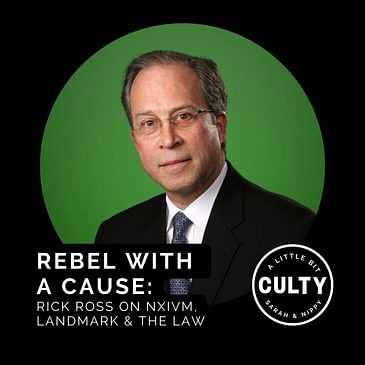This episode is sponsored by BetterHelp.
Hello there cult awareness content nerds: We see you. We honor you. And let’s be honest: We are you. In this episode we (finally!) sit down with OG anti-cult crusader Rick Alan Ross for a chat about NXIVM, what it’s like to be sued simultaneously by Keith Raniere and Werner Erhard, and the ongoing audacity of the whole weird world of LGATs. This ALBC guest is a perennial thorn in the side of any and every modern cult that’s ever culted. Get ready to get schooled, and enjoy this one, kids.
SHOW NOTES:
Rick Alan Ross is the founder and Executive Director of The Cult Education Institute. He is an internationally known expert regarding destructive cults, controversial groups and movements and author of the book "Cults Inside Out: How People Get In and Can Get Out." Since 1982 he has been studying, researching and responding to the problems often posed by controversial authoritarian groups and movements.
Ross has been qualified and accepted and testified as an expert witness in court proceedings across the United States including US Federal Court. He has also frequently assisted local and national law enforcement and government agencies.
He has personally assisted thousands of families in an effort to help the victims of destructive cults, groups and movements.
Ross is one of the most readily recognized experts offering analysis about destructive cults, controversial groups and movements in the world today. GQ Magazine identified "Rick Alan Ross [as] America’s leading cult expert." And Britain's FHM Magazine named him "America's number one cult buster."
He has been a paid consultant for the television networks CBS, CBC and Nippon of Japan. And also was retained as a technical consultant by Miramax/Disney.
Ross' commentary has been quoted within publications such as Time Magazine, People, The New York Times, The Chicago Tribune, The Boston Globe and theWashington Post.
His appearances on national television have included a wide range of venues from news programs such as the "Today Show, "CNN World News," "Dateline", ABC 20/20 and "48 Hours" to popular interview shows such as "Oprah," "Dr. Phil" and "Inside Edition."
Ross has lectured at such prestigious institutions as Dickinson College, the University of Chicago, Carnegie Mellon University, Baylor University, University of Pennsylvania in Philadelphia, Wuhan University, China, Zhengzhou University, China, GuangXi International University, China, Heilongjiang University, China, Shandong University, China and Assumption University, Thailand.
Ross' analysis has been sought on virtually every major cult story for decades.
Also…Let it be known far and wide, loud and clear that…
The views and opinions expressed on A Little Bit Culty do not necessarily reflect the official policy or position of the podcast. Any content provided by our guests, bloggers, sponsors or authors are of their opinion and are not intended to malign any religion, group, club, organization, business individual, anyone or anything. Nobody’s mad at you, just don’t be a culty fuckwad.
Check out our lovely sponsors
Join ‘A Little Bit Culty’ on Patreon
Get poppin’ fresh ALBC Swag
Support the pod and smash this link
Cult awareness and recovery resources
CREDITS:
Executive Producers: Sarah Edmondson & Anthony Ames
Production Partner: Citizens of Sound
Producer: Will Retherford
Writer & Co-Creator: Jess Tardy
Theme Song: “Cultivated” by Jon Bryant co-written with Nygel Asselin

